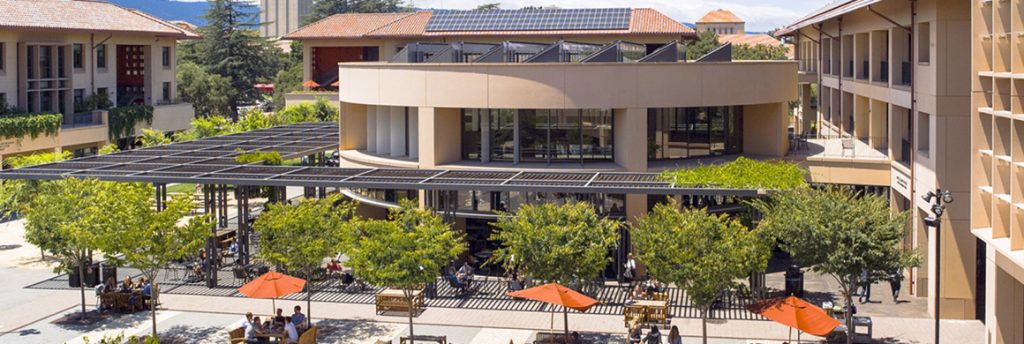When it comes to startups, no metro is hotter than San Francisco. With entrepreneurial spirits higher than ever, the Stanford Graduate School of Business—located on the eastern side of Stanford University’s campus in Palo Alto, California—has made a point to offer plenty of coursework and resources to students hoping to pursue a life of entrepreneurship. The school’s proximity to Silicon Valley had help it gain a reputation for its strengths in entrepreneurship and the high-tech industry.
Stanford GSB Entrepreneurship
Stanford Graduate School of Business was founded in 1925 at the request of future U.S. President and Stanford alumn Herbert Hoover. The school was designed as a west coast alternative to eastern business schools. Today, Stanford only offers a full-time, two-year residential MBA program.
In the first year of the full time program, students examine complex managerial issues with the General management Perspective series of courses, including the Critical Analytical Thinking (CAT) seminar, in which students analyze, write about and debate fundamental issues, questions and phenomena that arise in management.
During the second year of studies, students can take electives courses to broaden their knowledge in a specific area. Possible elective courses include: Entrepreneurship, Accounting, Finance, Global Management, Human Resources, Information Technology, Leadership, Managerial Economics, Marketing, Operations, Organizational Behavior, Political Economics, Public Management and Strategic Management.
Elective courses change based on feedback and demand, but here is a sampling of recent entrepreneurship electives at Stanford GSB:
- Aligning Start-ups with Their Market
- Create a New Venture: From Idea to Launch
- Entrepreneurship and Venture Capital
- Entrepreneurship from the Perspectives of Women
- The Startup Garage: Testing and Launch
- Social Entrepreneurship and Social Innovation
What are some additional resources and programs available to budding entrepreneurs?
Stanford is home to the Center for Entrepreneurial Studies — a place that, according to the GSB, is “building a dynamic global community of entrepreneurs and thought leaders who are changing the world.”
CES aims to make entrepreneurship easy and help graduate business students understand the myriad of issues facing entrepreneurs and startup companies. CES acts on this mission in a number of ways including:
- Researching Entrepreneurship: CES promotes research that advances entrepreneurial thinking. You can read a number of academic journal articles based on CES-supported research projects and other entrepreneurial research and insights from Stanford GSB faculty here.
- Teaching Entrepreneurship: CES supports the creation and operation of courses on a wide variety of topics, including entrepreneurship, innovation, and early-stage investing and develops curricula and experiential learning opportunities for both MBA and MSx students interested in exploring an entrepreneurial career path.
- Student Programs: CES supports students through experiential courses and programs, such as the Stanford Venture Studio and Startup Garage.
The Stanford Venture Studio is a learning facility and co-working space for Stanford graduate students who want to learn about designing and creating sustainable, high-impact ventures. According to the GSB, the Studio offers:
- 24/7 access to co-working space at the vibrant NGP CoLab equipped with tools for ideation, prototyping and experimenting
- Weekly one-to-one advising with founders, venture capitalists, product experts, industry veterans, and faculty from various schools
- Online and offline forums to facilitate support and collaboration from peers and 900+ Venture Studio alumni
- Participation in Demo Day—an opportunity to present your business idea and solicit feedback from top investors and industry professionals
- Suite of free resources such as AWS credit, subscription discounts, access to pro-bono legal services and software tools
- Close ties with student groups, programs and centers across campus, as well as industry organizations to provide students with relevant connections and networking opportunities
Meanwhile, the Startup Garage is a hands-on, project-based course where students design and test new business concepts that address real-world needs, and learn to apply the concepts of design thinking, engineering, finance and business organizational skills. According to the GSB, the course is perfect for developing startups in the for-profit and nonprofit spaces. The experience is even beneficial for those who don’t end up starting up their own venture.
Lastly, Stanford offers an Entrepreneurial Summer Program (ESP) to students. This experiential learning opportunity allows students to try they hand at solving the biggest challenges faced by early stage companies. ESP comprises:
- An 8-to-10-week summer internship with an early-stage company
- Mentorship from an experienced individual at the company
- A community of ESP peers
- Programming provided by the CES
- A matching living allowance for companies with financial need
According to GSB, 14 percent of the MBA class participated in ESP last year, and 68 percent of companies who applied to host an intern were matched with an intern.
